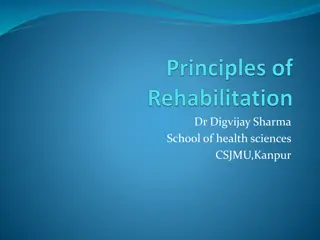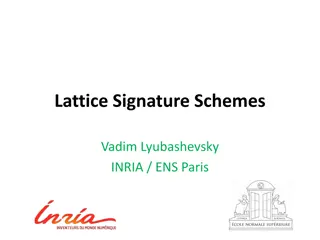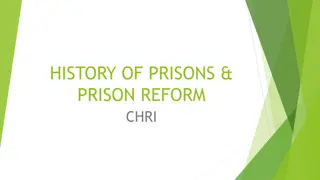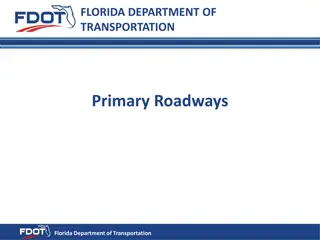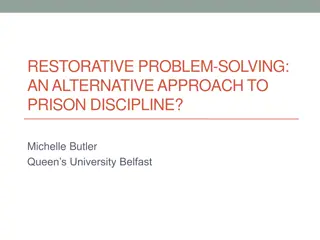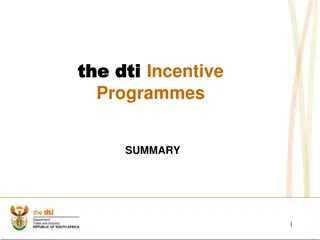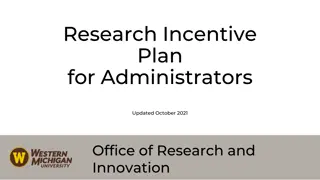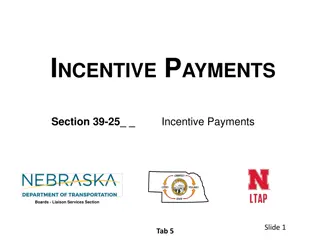Understanding Prison Incentive Schemes for Positive Rehabilitation
Explore the potential impact of incentive schemes on creating calm and hope in prisons, drawing insights from previous evaluations. Consider factors influencing successful incentive programs and how they can help in re-settling prisoners through addressing various issues like attitudes, thinking, drug problems, and safety. Recognize the importance of cognitive skills training, conflict resolution, and rehabilitative culture in fostering positive change and rehabilitation of offenders.
Download Presentation

Please find below an Image/Link to download the presentation.
The content on the website is provided AS IS for your information and personal use only. It may not be sold, licensed, or shared on other websites without obtaining consent from the author. Download presentation by click this link. If you encounter any issues during the download, it is possible that the publisher has removed the file from their server.
E N D
Presentation Transcript
Prison incentive schemes: what, why, how? Dr Rosie Travers Evidence-Based Practice, HMPPS Rosie.Travers@justice.gov.uk
Why might we expect an incentive scheme to help create calm and hope in our prisons? What can we learn from previous evaluations of IEP and similar schemes? Do incentives always incentivise? What does the evidence tell us about the likely characteristics of a successful incentive scheme?
Re- settle Prisons that enable positive change Address attitudes and thinking Address drug & alcohol problems Rehabilitative culture; Rehabilitative staff prisoner relationships Safety, Decency & Fairness
Poor food (Overcrowding) Dirt & dilapidation Lack of basics Can't fix things Poor conflict resolution skills Immaturity and impulsivity Over-sensitivity to insult and rumination Poor tolerance of stress and frustration Individual Poor Environment & Decency (imported factors) The evidence on drivers of prison violence Lack of Respect & Justice Lack of Activity Boredom NPS demand Anti-social hierarchy & status Debt & Bullying Sleep disturbance Procedural injustice Illegitimate uses of authority Lack of respect High use of force HMPPS Evidence-Based Practice Team
Cognitive skills training Conflict resolution training Stress tolerance training e.g. mindfulness Nutritious diet Enable personal space Clean environment Environment & decency Individual The evidence on drivers of safety Respect and Justice Activity Procedural justice Respectful relationships Legitimate authority Rehabilitative culture Time out of cell Peer support Exercise & fresh air Work Good sleep patterns HMPPS Evidence-Based Practice Team
Rehabilitation means enabling people to move from ATTITUDES THAT SUPPORT CRIME to IMPULSIVITY to thinking of consequences, taking other people s perspectives, and managing strong emotions an non-criminal identity that cares for others and feels optimistic about a life without crime. DEBT to BINGE DRINKING to sensible drinking or sobriety HOMELESSLESS to having and keeping suitable accommodation PROBLEMATIC DRUG USE to safe use or abstinence money management skills POOR USE OF LEISURE TIME to finding satisfaction in leisure activities that don t involve crime POOR FAMILY RELATIONSHIPS to mutually warm, caring and supportive family relationships CRIMINAL SOCIAL NETWORKS to having friends and social groups who aren t involved in crime LACK OF WORK to increased employability and achieving satisfying employment Evidence-Based Practice HMPPS
Some features of a rehabilitative culture . Stress Stress- -reducing reducing physical physical environment environment Rehabilitative Rehabilitative Leadership Leadership Fair Fair Builds social Builds social capital capital Encourages Encourages identity change identity change Gives Gives Hope Hope Relationships Relationships processes processes Staff have Staff have coaching/ coaching/ FMI skills FMI skills Leaders Leaders consistently consistently model and model and encourage encourage rehabilitative rehabilitative behaviours and behaviours and attitudes attitudes People People address & address & treat each treat each other other respectfully respectfully Easy for Easy for people to people to contact and contact and to be to be contacted contacted by family & by family & friends friends Access to Access to green and green and nature nature Staff believe Staff believe people can people can change change Peer mentor Peer mentor and peer and peer support support schemes (Do schemes (Do Good Be Good Be Good) Good) Coach in Coach in perspective perspective taking & taking & problem problem- - solving solving Clean and Clean and decent decent Decisions Decisions always always explained explained People People believe they believe they have a have a future, & future, & are assisted are assisted to plan for to plan for how it will how it will be better be better Staff are treated Staff are treated with fair with fair processes processes Variety of Variety of colour & colour & visual visual interest interest People are People are able to take able to take decisions & decisions & manage their manage their lives lives Reward new Reward new behaviours behaviours Voice Voice Staff have Staff have legitimate legitimate authority authority Good Good dark & dark & quiet at quiet at night night Fair & Fair & transparent transparent processes processes Encourage Encourage participation in participation in rehabilitation rehabilitation activities activities Clear Vision, Clear Vision, Values Values & Expectations & Expectations Reward new Reward new behaviours behaviours more than more than punishing punishing wrongdoing wrongdoing Everyone Everyone helped to helped to find their find their strengths & strengths & talents talents Busy with Busy with meaningful meaningful activity activity Procedurally Procedurally just just comms comms Kindness & Kindness & caring caring
Why should we expect an incentive scheme to help create calm and hope in our prisons? Three things determine the behaviour choices we all make: motivation, capability and opportunity. In encouraging cooperation with the rules of the prison community and progress through the sentence we will need to consider how to provide the right opportunities, to develop missing skills and to boost prosocial motivation. Could an incentive scheme help? What do we know about behaviour change that we need to bring in here? Punishment has an important function in our community but it doesn t work very well to bring long term behaviour change. The most effective way to shape others behaviour is to notice and reward (reinforce) the behaviour we want to see more of.
Punishment may be required, but on its own it will not change behaviour or deter people from impulsive actions Punishment and Changing Lives 3. 1. Punishment is used for different reasons Immediate These are difficult conditions which we can rarely meet It is most likely to change behaviour when it is Individual deterrence Severe Retribution Incapacitation Consistently delivered General deterrence Rehabilitation Punishment often results in compliance, but not internalisation of values. Evidence points to a range of challenges: 4. 2. Deterrence theories assume violence is a rational choice, that occurs after people have weighed up the expected costs and gains . Decrease in motivation to internalise the punisher s values Immediate compliance Aggression But evidence suggests that much violence is impulsive or that choices felt limited. Also young people with conduct disorder are less sensitive to punishment but more sensitive to reward Feelings of depression, distress, humiliation and helplessness Damaged relationship with the punisher Delinquency Continuation of punishment with own children Increased likelihood of spousal abuse 9
Reward is a skill thats simple to learn and effective to use and can be used by everyone who has contact with people under supervision 12 TIPS for changing behaviour through reinforcement Effective Reward & Reinforcement REWARD It is most valued from someone who liked and respected Produces robust gains in a variety of desired behaviours. Verbal reward works best Catch people being good Positive reinforcement teaches an individual what to do. Identify opportunities - make it immediate Use reward at least 4x as often as punishment. Make it frequent Think small The most effective kind of reward is verbal reinforcement. Make it personal, warm and encouraging Make it the first option Include a coaching element INTERVENTION Evidence suggests that causes of violence can be addressed through interventions such as conflict resolution training, mindfulness and cognitive skills training Beware of unintentional punishment Make it earned Help each other Most successful approaches teach skills and use active, participatory methods. 10
What can we learn from schemes that have tried to apply the evidence on reinforcement most closely: contingency management schemes or token economies ? A 2014 review considered 29 studies exploring the impact of contingency schemes in a range of secure settings. Concluded these schemes produced marked improvements on institutional adjustment and educational and work-related behaviours . The schemes were successful for all age groups and both genders. The weakest effect was from the only study of a punishment scheme.
The review identified the characteristics of the most successful schemes: Effective schemes are those which are implemented in an environment where staff-prisoner relationships are good, and where staff are committed to providing humane care. Successful schemes will focus on creating teaching moments rather than delivering rewards or punishments by rote. Reward should be used at least four times as often as punishment, and the rewards on offer should be based on what prisoners say is important to them. There has to be a strong commitment to monitor any scheme like this very closely so that it does not deteriorate into a coercive, punitive, process that increases anti-social behaviour. Schemes should be overseen by people who are very familiar with the theory of behavioural conditioning as it is easy for the implementation to drift away from the theory. Prisons that run such schemes must take very seriously the importance of always living up to their promises.
Research on our own IEP scheme The Cambridge evaluation of the early days of the NOMS IEP Scheme (Liebling et al., 1999) reported that contrary to expectation, the IEP scheme led to increased problems. Misbehaviour increased rather than decreased, and prisoners perceptions of the fairness of the system and staff deteriorated. Prisoners appreciated the idea but not how it was implemented. Prisoners progress and participation in the regime deteriorated across all the ten sites involved in the evaluation, and their relationships with staff deteriorated in all but two. The researchers concluded that these unwanted effects were caused by the overly strong emphasis on the punitive aspects of the IEP scheme. Prisoners who felt treated unfairly by IEP quickly became defiant and resentful, and some became highly distressed.
And Despite the evidence of detrimental effects, staff perceived the scheme to be a success. They liked the authority that IEP gave them, and felt more in control, believing that behavior was improving - when it was in fact deteriorating. Certain types of prisoners were particularly likely to respond poorly to IEP: prisoners at risk of suicide, who already found it hard to engage with the regime, and who were least able to apply the self-control IEP requires. On the other hand, prisoners who were higher up the prisoner hierarchy seemed able to exploit the scheme, receiving enhanced benefits while at the same time playing a lead role in the illicit prison economy.
Prison Reform Trust consultation (20 years after the Liebling evaluation of IEP) Any incentives scheme will not work without getting basic issues right first. Defining what these basics are needs attention as well as delivering them. Incentives need to be meaningful to prisoners for any scheme to secure their support. Meaningful incentives outlined in this report include increased use of ROTL, higher rates of pay, better quality visits and, crucially, a chance to reduce time in custody. Relationships between staff and prisoners define whether any scheme will work or fail. Mutual respect, positive encouragement and collaboration must underpin the approach, and a willingness to place trust in a prisoner characterises the most meaningful incentives. Prisoners in turn want to trust the system, but the system needs to be trustworthy. Consistency, transparency and accountability are essential, and are widely lacking.
The principles of effective behaviour management Encourage, create opportunities for and reinforce, the behaviour you want to see Target, and respond to the needs of those who need the most help Get ahead of problem behaviour - Hot spots - Remove triggers and reinforcers - Teach skills -Clear rules and expectations - Recognise and address causal factors - Rewarding positive behaviour or progress - Appropriate instruction and activities - Bring in outside agencies - Contingency management schemes Ensure consistency and fairness in application of rules Take an institution-wide response Work on relationships with authority - Strong leadership - Inconsistency weakens deterrent effect - Consistency across staff - Increase positive interactions - Clarity on what s acceptable - High expectations - Increase trust and perceptions of legitimacy - Proportionate responses - Support (from and for staff and family) - Perceived fairness predicts compliance https://intranet.noms.gsi.gov.uk/__data/assets/pdf_file/0011/941519/evidence-summary-behaviour-management-in-schools.pdf
Procedural Justice perceptions What are the things that lead to people finding a process fair? When people believe the process of applying the law (how decisions are made, rather than what decision is made) is fair, it influences their views and behaviour. VOICE NEUTRALITY Being able to tell their side of the story and this being sincerely considered by the authority figure Transparent and open use of rules, neutral and principled decision making When people feel treated fairly and justly, they have more confidence in authority, see this as more legitimate, and they are more likely to accept and abide (or commit to abide) by decisions/rules/sanctions/the law. RESPECT TRUSTWORTHINESS Taking issues seriously, being courteous and polite, respecting rights Sincerity and care, trustworthy motives, being open, honest, doing what is best for everyone Outcomes matter, but process matters more
Procedural Justice perceptions staff Procedural justice in organisations has been linked to greater compliance with policies and rules, and better conduct of employees (use/abuse of power, good conduct/ wrongdoing) Employees: When staff feel fairly and justly treated in the workplace, research shows this is associated with: Less stress, sickness absence and job burnout More commitment to the organisation Less likely to want to leave the job Better life and job satisfaction Additionally, for prison officers, better PJ perceptions are associated with: Less support for punishing prisoners More support for rehabilitating prisoners Less fear of being victimised by prisoners And there seems to be some kind of knock on effect how fairly staff feel treated is linked to how fairly prisoners feel treated.
Perceptions of Procedural Justice: what difference do they make? Prisoners: When prisonershave more positive perceptions of PJ this predicts significantly: Lower levels in misconduct (ranging from obeying orders to serious assaults) in prison. Better emotional/psychological health; lower rates of self-harm and attempted suicide. Lower rates of reoffending after release. More positive beliefs about desistance from crime Evidence from policing and courts shows that PJ matters for cooperation and compliance in the CJS; for example: Improved compliance with the law Greater trust and confidence in police Greater institutional support for CJS Improved cooperation with attempts to tackle crime Improved respect and deference in interactions Increased paying of fines Probationers: When people under supervision in the community have more positive perceptions of PJ this predicts significantly better outcomes for: Self-reported crime Arrests Parole violations (Substance misuse?) findings a bit mixed for now Increased fine repayments
Improving PJ perceptions (some) specific behaviours Communicating that everyone s rights are important and are protected Offering chances to ask questions or raise issues (and taking these seriously) Explaining processes or programmes before starting Summarising and paraphrasing, active listening T V N V Introductions, using names, eye contact, courtesy, tone, vocabulary Explaining the purpose of changes or procedures Explaining reasoning for decisions Being approachable, not intimidating R T N R Giving people a chance to tell their story, and sincerely considering this Consulting with staff their perceptions and ways to improve Providing the right information at the right time Being consistent with the application of rules N V T V
Where does PJ apply in HMPPS practice? Whenever authority is being used (formally or informally) and we want to secure compliance, cooperation or decision-acceptance, THINK PJ! Just a few examples of when we use authority in HMPPS, but the list is endless . Headquarters/Centre Managers/Supervisors Frontline staff Staff performance reviews Disciplinary hearings Policies, rules and instructions, SINS, PINS Team/directorate management Promotion boards Task allocation IEP (or similar schemes) Adjudications Rules and day-to-day instructions Recall decisions Complaints handling GOOD/segregation reviews C&R / MMPR Audits Assurance processes Policies, rules and instructions (and changes to these) for HMPPS staff Change programmes
PJ is reasonably simple, swift and economic, and we can be pretty good at this, but it is deceptively simple, can be easily dismissed as common sense and lots of things can easily get in the way of us doing this consistently: Being in a rush Feeling stressed or annoyed Forgetting how important it is to the recipient Thinking it s obvious Thinking it s someone else s job The culture or norm of the organisation or interaction ( we ve always done it this way ) Thinking it s not deserved Because we aren t always aware of how we make decisions (there are more than 100 thinking errors or biases that influence our thinking!)
Does IEP feel fair in your prison? Are positive and negative behaviours monitored and noted equally by staff? If there is disagreement, is there the chance for a discussion between staff and prisoners to resolve? Do staff and prisoners understand what the IEP scheme is aiming to do? Voice Neutrality How does a person arriving at your prison get to know how your IEP scheme works? Do staff feel rewarded when they do this work well? Is the scheme as swift to reward as it is to punish? Respect Trust Is it clear what a person in your prison has to do to get a positive or negative entry or to move up or down a level? Is the scheme delivered respectfully and in a way that is responsive to people s needs? Is the prisoner involved in the decision making to change IEP level?
Issuing a warning Dear Mr/Ms/Mrs [name] Today I noticed/saw . (you wearing flip flops on the landing) Respect Description of Situation Trustworthy motives As I explained to you / As you may be aware / wearing of flip flops is against our prison rules because they are a health and safety risk. The risk of you slipping, tripping or falling is significantly greater when wearing flip- flops. This could cause injury to you or others. It is our responsibility to look after you and ensure you remain safe from harm Neutrality I have challenged you on a number of occasions about breaking this rule. I am not targeting you directly, and apply the same challenge to every other prisoner who breaks this rule. Voice I have asked you if you are aware of this rule. You have agreed that you are but have told me you forget and/or think it s a stupid rule. I understand that the reason behind this rule may not sound very important to you. But it s my job to make sure that people don t get hurt here and we have to follow rules of a workplace rather than a home which is why some rules may not feel like normal life. In many workplaces, people can t wear flip flops for health and safety reasons in certain areas and it s the same here. Decision (all PJ principles) I have given you several opportunities to change this behaviour but as you have not done so, I have made the decision to issue you with an IEP warning. I am giving you an IEP and not placing you on report as I would like to give you the chance to reflect on, and change, this behaviour before you receive any kind of punishment for it. If you have already received any other warnings, or if you receive any more, you may have to have your IEP level reviewed. I think this is an appropriate action to take, but if you disagree, you can raise your grievance via the complaints process or with the wing manager/CM. Support If I, or your keyworker, can help you in any way to change this behaviour in the future, or help you to understand the reasons for any of the rules, please let us know. 24 Thank you
Recognising positive behaviour Dear Mr/Ms/Mrs [name] Yesterday I noticed/saw . (you staying calm when your gym session was cancelled) Respect Description of Situation Trustworthy motives Here at [prison] we are committed to recognising positive behaviour and when people do things well, and to not just focus on when things don t go well. I believe progress should be recognised and rewarded. Neutrality Yesterday I saw you face a frustrating situation and stay calm. When you discovered your gym session was cancelled I heard you ask the officer why this had happened, and even though you were frustrated with their answer, you accepted it and walked away rather than getting angry at them. Your response helped keep the situation calm, and avoided conflict. I know how important your gym sessions are to you, and how disappointed you feel when these are cancelled. You have told me how hard you have found managing your anger in the past, and that in the past you wouldn t have reacted in the calm way that I saw yesterday. I am going to write a detailed positive record of this on NOMIS so that it can be considered when you have your next IEP review. [Consider referring to reward scheme, if one operates in the prison, too] I want to keep supporting you in using the skills that I saw yesterday. I d like to talk about this more in your next key work session. Voice Outcome Support Thank you and well done. 25
A starter for ten? Is the wider context right? An incentive scheme is just one part of a much wider picture. Trust? Respect? Basics? Consistency transparency accountability. Are expectations and consequences clear to residents and staff? Incentives for what?! Are staff trained in the skills of behaviour management specially in the skills of positive reinforcement and catching people doing good? Are they themselves reinforced for doing this work well? Is your leadership team modelling catching good ? Is there adequate monitoring and supervision to prevent the scheme from drifting into a scheme more focused on punishment than reward? Are the rewards you offer meaningful? Are you rewarding four times as much as you punish? How will you spot where you need to offer extra support to someone who might struggle with an incentive scheme? Does it feel fair? Do your residents consider the scheme is procedurally just? Do your staff? How will you routinely check in with staff and residents?





